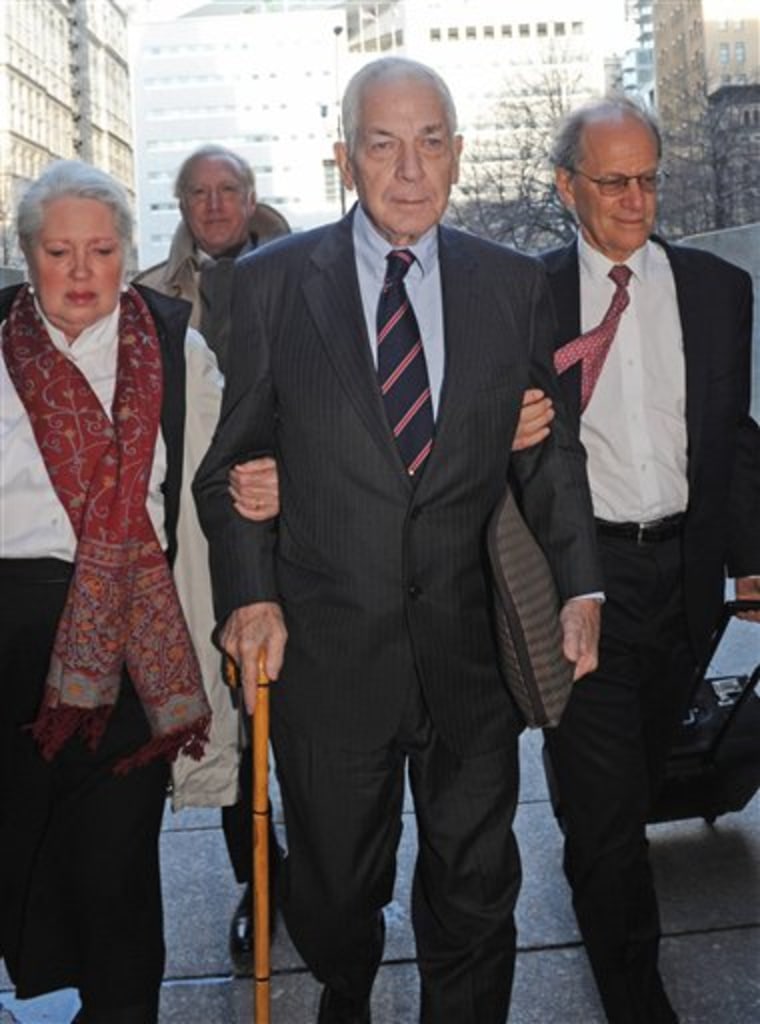Anthony Marshall has had a life of privilege and pain as philanthropist Brooke Astor's only child.
Born into wealth, he joined the Marines after high school and was wounded in the battle of Iwo Jima. He later became an ambassador, author and Broadway producer before his life began to crumble when his own son accused him of mistreating the aged Astor and doyenne of New York society who married into one of the country's first ultra-rich families.
As he faces the possibility of spending the rest of his life in prison, the normally reserved Marshall is taking a surprisingly personal approach to stay free.
Convicted of looting the fortune his mother so generously shared, the ailing 85-year-old Marshall faces sentencing Monday on charges that carry a mandatory prison term of at least a year and as long as a quarter-century. His lawyers say any prison time could kill him.
Marshall could remain free on bail during an expected appeal, but he is trying first for a dismissal of the part of his October conviction that requires prison.
He now depicts himself in court papers as a boy who eagerly took the name of a stepfather who "wanted no part of me in his life," and as a man so frail he sometimes needs his wife's help to relieve himself. Marines, ministers and friends — including Whoopi Goldberg and Al Roker — portray him in letters to the court as a dedicated son and public-spirited man misconstrued as a symbol of patrician greed.
Misunderstood or ruthless?
"People like Tony, who are the sons and daughters of the very wealthy, are often misunderstood and face unjustified harsh reaction based solely on who they are and how they are perceived," wrote Goldberg, a neighbor in Marshall's Manhattan apartment building. "Hasn't Tony been through enough?"
Prosecutors say Marshall is making a cynical, 11th-hour effort to dodge the consequences of his crime. They recently called him in court papers "nothing more than a 'thief in a three-piece suit.'"
Friend or foe aside, Marshall is abruptly baring a life he had largely kept private. He didn't testify or call even one witness at his five-month-long trial.
"Tony has always been the stiff-upper-lip Marine," said Meryl Gordon, author of "Mrs. Astor Regrets: The Hidden Betrayals of a Family Beyond Reproach," who has followed his trial. "So for him to take what he thinks that he has kind of hidden away, and not really acknowledged, as a bid for mercy is really astonishing."
Astor's third husband, Vincent Astor, was the great-great-grandson of John Jacob Astor, who made a fortune in fur trading and New York real estate and was among the country's first multimillionaires. She gave away nearly $200 million to institutions and was awarded a Presidential Medal of Freedom for her generosity, the nation's highest civilian honor.
When she died in 2007 at age 105, she left a fortune worth nearly $200 million.
Longshot strategy
Her son's effort now to avoid prison faces significant burdens. He's relying on a state law that allows dismissals of legally substantiated charges "in furtherance of justice," a provision courts use sparingly.
Marshall says heart surgery, a digestive disease and other medical problems make him too sick to manage life behind bars — claims prosecutors and prison officials have rebuffed.
Marshall also argues that he doesn't deserve to go to prison for the nonviolent crime, offering his life as evidence.
In more than 70 letters to the court, some supporters note the military service that earned him a Purple Heart and his diplomatic assignments in such posts as Kenya and Turkey. Others insist on his good nature and devotion to his late mother.
"This is a personal catastrophe, which he will have to live with for the rest of his life," retired Air Force Col. Stan Beerli wrote.
Marshall's downfall began in 2006 when one of his sons, Philip Marshall, filed civil court papers saying his father was stealing from Astor while neglecting her health and hygiene. Anthony Marshall denied the claims but stepped aside as his mother's guardian.
The family feud spurred a criminal investigation and ultimately a trial featuring such high-wattage witnesses as Barbara Walters and Henry Kissinger, both friends of Astor's.
Prosecutors cast Marshall as a money-hungry, hardhearted heir who couldn't wait to get at his mother's millions. He exploited her dementia to engineer changes to Astor's will that benefited him over her favorite charities, awarded himself a more than $1 million raise for managing her money and even plucked artwork off her walls, prosecutors said.
Marshall's lawyers say he had legal authority to give himself gifts and raises on her behalf, and she knew what she was doing when she altered her will to benefit a son she loved.
No love lost with stepdads
He was her son by her first husband, J. Dryden Kuser, whom Marshall describes in recent court papers as an alcoholic who pushed the pregnant Astor down a flight of stairs. They divorced, and she later married stockbroker Charles Marshall; her son took his name. After Charles Marshall's death, she married Vincent Astor, who died in 1959. Anthony Marshall says both stepfathers virtually exiled him from his mother.
The trial depicted a fraught relationship between him and his mother, who disapproved of his wife and once told a friend, "I wish Tony had made something of himself instead of waiting for the money."
It left a sad impression on juror Barbara Tomanelli.
"This is a dysfunctional family, for all the advantages they had," she said after the verdict.
Estate lawyer Francis X. Morrissey Jr., 66, also is to be sentenced Monday. He was convicted of helping manipulate Astor into changing her will. He could get up to seven years behind bars.
Prosecutors haven't said what sentences they will suggest. Morrissey's lawyer didn't return telephone calls.
